|
“Young at Heart” Message We hear references to shepherds and sheep quite often in Biblical scripture. We intuitively understand what a shepherd is and what it means to watch and care for a flock because we’ve seen images, and the references to the work of a shepherd come up often enough in scripture that we feel like we can understand it. When you do an internet search for “shepherd and flock” you get a variety of images like this one: We assume that watching a flock means wandering around in beautiful mountain regions with a flock of sheep and maybe a dog. Sounds like a great life! The reality is, I have no idea what it means to be a shepherd, and neither do most of you, I’m assuming. But, I do know what it’s like to live with one! Well, kind of… For those of you who haven’t met my dogs yet, the white one is Lacey and the brown and white one is Lyra. Lacey is a purebred Great Pyrenees and Lyra is half Pyrenees and half Saint Bernard. Great Pyrenees are livestock guardian dogs. In other words, they are ”shepherds.” Perhaps not in the way we envision shepherds in the Bible, but they do the work of a shepherd and they take their work very seriously. Oddly enough, their work is more like the work of a “shepherd” in the Biblical sense than the work that shepherding dogs like Border Collies or Cattle Dogs do. Livestock guardians are not concerned about control, but about safety and protection. This breed is specifically created to watch over flocks of sheep. They are bred to keep the flock safe from predators primarily, but also to keep them from injuring or harming each other. A livestock guardian dog can go from this: To this in a matter of seconds. Guardian dogs sleep with one eye open, and both ears alert at all times. They are always ready to jump into action if there is a threat to their flock. They live in harmony with their flock because it isn’t about control – it is about mutual curiosity, compassion, and concern for safety. It does not matter what the weather is like – a guardian dog braves the elements with the flock. They are not about to leave their flock to ease their own discomfort. Guardian dogs may seem like they have a tough outer shell, but they are soft and caring and nurturing to those in their flock. It may sound silly, but these dogs offer a real-life example of what is meant when we talk about shepherds in the Bible.
And this is an important distinction because today, we heard two different scripture passages that reference shepherds and sheep. The Message But these passages also reference kings, and today is Reign of Christ Sunday, where we lean heavily into this notion of kingship and kingdoms. So, while shepherds and flocks invite imagery of compassion, safety, and protection, the terms “king” and “kingdom” invite imagery of power, control, and patriarchal societies that imply authority rather than mercy, safety, protection, and healthy leadership. So let’s talk about all of this imagery in these passages and what it might mean for us today. Both of these passages ultimately offer us insights around justice issues. In the Ezekiel passage, God is speaking first about gathering the scattered flock. It offers us a sense that God would reach us no matter how far we strayed from safety – no matter how far into the depths of darkness and despair we walk. It begins with this sense of hope that no matter where we end up, God will find us and bring us back into God’s grace and mercy. But then, there is also a word of what I would call caution. God also gives a warning: Is it not enough for you to feed on the good pasture, but you must tread down with your feet the rest of your pasture? When you drink of clear water, must you foul the rest with your feet? And must my sheep eat what you have trodden with your feet and drink what you have fouled with your feet? In other words, God provides us with this safety and protection, not so that we can be selfish and take what we desire while ruining the rest for others, but so that we can share the abundance God provides and use it to lift up and serve those around us. The shepherd or guardian does not protect us from the wolves so that we can go and harm each other instead. The livestock guardian dog does not keep the coyotes from killing the sick or weak only to have the healthy and strong members of the flock kill the sick or weak instead, even if unintentionally. God does not protect us and pull us from the depths of despair only to have us turn around and harm our fellow humans or the environment which God created for all of us to share. This passage in Ezekiel makes it clear that we must be careful not to allow ourselves to become the strong that overpower or overshadow the weak. Likewise, the passage we heard from Matthew supplements the Ezekiel passage well. We might struggle to understand what it would be like to be under the rule of a king because our government and society is set up very differently than it was in Jesus’s time. But, it is helpful to remember that the people Jesus is speaking to do know what it’s like to live under the rule, power, and authority of a king. That type of leadership could be damaging, but it was leadership that the people understood. From the throne, the king separates the people. Jesus uses the imagery of the shepherd to illustrate the separation of the goats from the sheep. On one hand the sheep are the blessed – those who clothed him when he was naked, fed him when he was hungry, and welcomed his as a stranger. The people considered the “sheep” wondered when it was that they fed him, clothed him, and welcomed him. Jesus tells them that they did these things to him whenever they did them to the least of them. On the other hand are the goats, who did NOT clothe him when he was naked, feed him when he was hungry, or welcome him as the stranger. And once again, the “goats” wonder when exactly they did NOT do these things? And Jesus tells them that when they did not do these things to the least of them, they also did not do them for Jesus. The reason Jesus chooses to create this separation between “sheep” and “goats” is so that they understand this notion of power and control and kingship. He is trying to illustrate for them the difference between the kingdoms of authority and power and control that they are used to, and the kingdom of heaven, which is quite a different type of kingdom. It is a different type of kingdom because Jesus is a different type of king. And this is why we talked so much about the imagery of the shepherds. Jesus is not a king who is concerned about power and authority and control. Jesus is reframing what it means to be a king, and likens it instead to being a shepherd. A guardian. A leader. A protector. Jesus reigns because Jesus is willing to step into the darkness, into the unknown – he is willing to search for the lost, to protect the weak, and to feed the hungry. And in his kingdom, he invites us to do the same. When we do these things for the least of us, we do it for Jesus as well. And, when we do NOT do these things for the least of us, we also do NOT do them for Jesus. Jesus invites us into this kingdom not because he expects to control us, but because he expects us to live out his example. He expects us to lean into this notion of protecting and supporting those who are weaker than we are, just like we hope to be supported when we are weak or vulnerable. Just like livestock guardians live to protect their flock and do not want to see the flock harm each other, Jesus lives to protect us and does not want to see us harm one another. Any harm we do to each other, we also do to Jesus. As we join Jesus in his kingdom and we celebrate his reign, we must remember that we are invited to become like shepherds – protecting, serving, clothing, feeding, and welcoming one another as well as the stranger or neighbour. As we celebrate the Reign of Christ today, may we remember that his kingdom is very different than the traditional kingdom we imagine. Jesus’s kingdom is one of love, compassion, care, and mercy. May we live out the ideals of this kingdom in our everyday lives, serving one another, caring for one another, and welcoming one another into the glory of Christ’s kingdom. Amen. God of healing and transformation, we hunger and thirst for your abundant life. We bring you our sorrow and ask for the bread of joy; we bring you our despair and ask for the bread of hope; we bring you our weariness and ask for the bread of inspiration. Meet us here. We need the bread of heaven to sustain us as we journey to find our way, that we may we be one with you. In Jesus' name, we pray. Amen.
0 Comments
 “Young at Heart” Message Let’s pretend for a moment that I’m extremely independently wealthy. I earned that money by being pretty dishonest, taking advantage of situations and of people. I know, I know – it’s hard to believe because I’m a pastor, but bear with me for a minute. I am going to be going away for a little while, but my money works really hard for me and I don’t want to let it sit idle while I’m gone. So, I have three volunteers who have agreed to help me keep my money safe. I am going to give each person some of my money before I go. While I’m gone, they’re going to do their best to make even more money for me. BUT, they absolutely cannot lose any of my money, or else! The first person will get $3,797,175. The second person will get $1,518,870. And the third person will get $759,435. Remember, the goal is to use that money to make as much extra money as you can while I’m away, but absolutely do not lose any. You can ask members of the church for help, but some of them might take your money, and others might double it. Choose wisely what you do with my money. [Jamie leaves and the volunteers decide what to do with her money] [Jamie Returns] So, how did you all do? The first volunteer asked the church for help, and doubled their money! They now have $7,594,350 for me. The second volunteer also asked for help, and doubled their money! They now have $3,037,740. However, the third volunteer decided not to risk losing all my money, and instead returned the exact amount I gave them. A pittance compared to what they could have earned for me. I am not a benevolent pastor! I entrusted this money to them, and two of them earned me significant money in return and will be rewarded. But the third volunteer will be banished from my sight! I am going to take their money and give it to the one who received the most, because at least they are willing to risk something to earn even more money for me. Harumph. The Message Yes, I know, that was a silly retelling of our scripture passage today. But, there was a purpose to retelling it this way. It is important to understand what exactly a “talent” is in this passage. A talent is a unit of currency which, at that time, was equivalent to approximately 15 years worth of wages. The average annual salary in Alberta as of October was $50,629. So, 15 years worth of wages using that average would amount to $759,435. The first servant in our scripture passage today was given 5 talents. So, if we do the math, that amounts to $3,797,175. In other words, that amount of money was equivalent to 75 years worth of wages for that servant. The second servant was given 2 talents, or approximately 30 years worth of wages. And of course the third servant was given 1 talent, or approximately 15 years worth of wages. The point in doing this exercise is to impress upon you the magnitude of what this “master” was entrusting his servants with. And, he was not a benevolent man. He was giving his servants this money and trusting that they would go and use his shady methods to earn even more money. This money was not a gift. There were strings attached. This was clearly not a small amount of money. Most of us couldn’t even fathom what it would be like to hold $750,000 in our hands, let alone $3.7 million. These servants also presumably were quite trusted by their master. They were not brand new servants – there is no way this master would give servants he hardly knew this money. These servants knew how the master earned his money. So, there was also the threat of a master who “reaped where he did not sow and scattered where he did not scatter seed.” In other words, he was doing some shady things to earn his abundant wealth. And, he expected his servants to use similar methods when he entrusted his money to them. As is true for many of our scripture readings, and for many of the parables Jesus shares, there are multiple ways we could look at and interpret this story. Certainly, we could see some of the implications of capitalism, and the hard reality of a world where we all are encouraged to do things we may not do otherwise in the name of earning extra money. We could also talk about the master and the way we treat other people we work with, live with, or otherwise interact with on a regular basis. There are many different ways we could focus our attention, and many different lessons we could take from this passage. Jesus seemed to like to provide pastors with options for Sunday mornings. What I want to focus on today is this notion of abundance, risk, and reward. For today’s purposes, let’s set aside the parts of this story where the master does shady things and condemns the third servant. That’s a totally different sermon for another day. If we look at Jesus as the master in this story, and we consider the talents each servant receives as traits like love, grace, mercy, and peace, we can recognize that these servants of Christ have more than enough resources to go out into the world and do amazing ministry. And the first two servants do just that. They take their currency – their love, grace, mercy, and peace – and they spread it, and what comes back to them is doubled. The doors of opportunity were opened to them, and they took the risk and walked through the doors. Another way of looking at this would be to say they were called by Christ, and they said “here I am Lord. I will go, Lord. Send me.” The third servant, however, is filled with fear. Fear of the unknown, fear of the master’s response if he fails, and fear of failure itself. So he hides the grace, love, mercy, and peace he was given. He had good intentions of keeping them safe, of course. But those good intentions prevented him from using those traits to do good in the world. The doors were opened, the call was made, but he was afraid to walk through for fear of failure. His fear led him to be paralyzed. How often, in ministry or in life, do we become paralyzed by fear? Fear of taking certain risks, fear of failure if we try, or fear of losing everything we have. So instead, we hoard resources. We metaphorically bury the gifts we have been given out of fear of losing them. What if our call or our purpose is to use these gifts, to take risks, to share them with the world in ways we could not even imagine without God’s guidance? It is true that taking risks could lead to failure. But even in failure, there is often abundant opportunity for growth. And, often, even in failure, there is success as we learn something new about ourselves, about our relationship with God, or about the world. Jesus wants us to use the gifts we have been given – whether that’s money, time, talent, energy, or other resources – in ways that honour ourselves and others. He does not want us to bury our resources. He wants us to use them to thrive. Taking some risks – and being open to the possibility of failing or making mistakes – allows us to grow not only personally, but also in our faith and in our ministries. May we always be open to this growth. Amen. 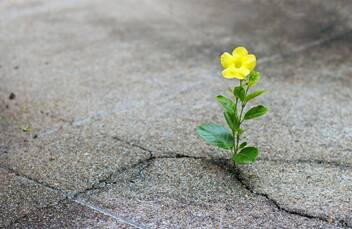 “Young at Heart” Message You may be seated. After church today, I’m throwing a last-minute party. It’s going to be the best party you could ever imagine. Yes, it’s going to be even better than the Christmas potluck. I’m going to have the best food you could ever imagine, and you don’t have to worry about bringing anything, which for some of you already makes it the best party ever! Everyone who attends will get 1 million dollars. Oh, and all of your dreams will be fulfilled. If you want a new car – you’ll get a new car. If you want a trip to France, you’ll get a trip to France. If you want the warmest pair of slippers you could ever imagine, you’ll get them. This is not a joke – it will be the best party you could ever imagine. So, who’s planning to come to my party after church? Oh, I forgot to mention – only these two sections of the church are invited. This section over here won’t be allowed in at the door. For those of you who aren’t invited, how does that make you feel? For those of you who were invited, how do you feel about those who weren’t invited? It doesn’t feel great on either side, really. If you were not invited to the party, it certainly feels unfair, and you might even feel a little anxious. After all, those who were invited are promised something amazing. And for those of you who were invited, it feels pretty unfair that you have access to this amazing party and the opportunity to fulfill your wildest dreams, but those who aren’t invited will miss out. You might even go so far as to beg me to invite those who weren’t invited. Maybe, you would even choose to protest my party unless I make it fair for everyone. After all, what kind of loving pastor invites only two-thirds of the church to such an amazing party? In our scripture reading today, this is essentially how the Thessalonians are feeling. They feel like they’ve been invited to the best party ever, but they have concerns about those who were not invited. The Message First of all, it is important to place our scripture passage from the Thessalonians into context. Scholars widely agree that 1 Thessalonians is the oldest book in the New Testament. Most scholars believe Paul wrote it during his 18-month stay in Corinth, before any of his other letters and even before the Gospels were written. It is important to understand the context of this text because we must understand what is happening in Thessalonika and where the people’s heads are at. They have very different concerns than we do today. The city of Thessalonika is located in modern day Greece. For many ancient Greeks, once people died, they were considered to be separated from the living and they were doomed to the underworld. This separation from the living wasn’t believed to be a punishment, though it was permanent. It was just the belief about death and afterlife at the time. In the letter to the Thessalonians, Paul is writing with his companions, SilvAnus and Timothy. They are writing letters to address specific issues in the communities they founded, of which this Christian community in Thessalonika is one. It is important to understand the context in which Paul is writing before we can really analyze the text and work to understand what it is telling us that can be applied to our lives today. The Thessalonians have been evangelized by Paul and his companions and they look forward to Jesus’ triumphant return, which they believed would be happening within their lifetime. Therefore, many of them were grieving because they believed that death had permanently separated them from their loved ones. In other words, they were concerned that those who died between the time Paul came to them and whenever Jesus would return would not be saved in the same way they would be saved. They were afraid that those who have died would miss the best party they had ever been invited to. So, this letter to the Thessalonians is part of Paul and his companions’ work to introduce a new way of thinking about death. Imagine what that must have been like for the Thessalonians. They desperately wanted to believe in the promise of Jesus Christ and his return, but they understood death very differently. What Paul and others were claiming sounded foreign to them. For some of them, it must have felt like a race between death, and Christ’s return. They were trying to reconcile their preconceived notions of death with this new promise they so desperately wanted to believe in. For them, Jesus was very different than any other Greek hero they were familiar with. Jesus was not held down or separated by death. Death was not permanent for those who died in Christ. And this gave those who were still alive and invited to the party hope that even if they died before Jesus’ return, they too would not be separated permanently from their loved ones. Pop culture today loves to imagine what it would be like to experience the Rapture. There have been many movies made about those who are left behind. But this notion of resurrection, life after death, and unending grace even for those who have gone before us is not meant to scare us into believing we may be left behind. Our pop culture movies would like us to believe that’s what it is about. It is not about fear. Rather, it is about hope. Hope everlasting. This letter to the Thessalonians is meant for those who lost children, siblings, parents, spouses, and other loved ones. It is meant to reassure them that even if they died before Christ’s return, they would not be excluded. They were still invited to the best party they could imagine. And this passage does not only give hope to the Thessalonians. It gives hope to every future generation that waits for Christ’s return. God has not forgotten those who came before us. God has not abandoned them. Nor has God forgotten or abandoned us. This passage is meant to reassure us that God will raise the dead up and we will see them again. Paul, SilvAnus, and Timothy ground their faith in Jesus’ death and resurrection because they are fighting for eternal hope. They are fighting for hope everlasting. Not just for the Thessalonians, but for all future Christians, including us. They seek to offer hope and encouragement that even if this life isn’t fair, even if we struggle on our journeys, that in death, we will be raised to life again. This passage offers the bold hope that all those in Christ – living and dead – will be there on the day when he will come again in glory, and they will dwell with him forever. Amen. God of hope, thank you for your endless love, grace, and care. Thank you for sending your son Jesus Christ to teach us and save us, and thank you for sending other teachers who have shared their prophetic ministries throughout history – both ancient history and more recent history. We are grateful for the hope you provide, and we are grateful that we are all invited to your table and no one is excluded. May your hope sustain us throughout our lives and deaths. All of this we pray in your name. Amen.  “Young at Heart” Message Today, we have two young people participating in a mini obstacle course. The course consists of some books on the floor, and a strip of tape they need to balance on, along with a chair they need to climb over. They have to try not to touch the floor. The first time, both participants get to complete the course with their eyes open. The second time through, one of the participants will be blindfolded, and they are told to race. The participant who doesn’t have a blindfold on will begin the course, but the blindfolded participant realizes the game isn’t fair. The participant who isn’t blindfolded comes back and helps to guide the blindfolded one through the course. The Message Thank you to our young people who were willing to try the obstacle course this morning! When I asked them to try the obstacle course with their eyes open, it seemed quite easy. But once one of their eyes were covered, it became much more challenging. Perhaps even impossible. It might have even started to feel hopeless, and maybe even a bit unfair. After all, one could see and the other couldn’t. But then, we saw something that gave some hope: the one who wasn’t blindfolded offered to help the other through the obstacle course. With guidance, they were able to finish the obstacle course together. In life, we sometimes encounter situations that make us feel hopeless. The obstacles that land in our path sometimes seem too much to overcome on our own. How do we maintain hope when things feel hopeless? In my role as a pastor, I get to talk with a lot of people, and often, people open up to me in ways they might not open up to other people. It is the nature of the work I do. I often hear people share their feelings of hopelessness about a situation or about the way of the world at any given moment. When people share these things with me, they often feel like the challenges just keep piling up. There doesn’t seem to be enough support, and the bad starts to feel like it outweighs the good. The obstacles that are placed in front of us can start to loom larger and larger, especially when our vision is clouded and we can’t see a clear path forward. How do we come to a place of hope in those times when we are looking through the veil of shadow? Often, Christian churches will teach that all we need to do to fix all our problems and feel better is to have hope and trust in God. However, when we struggle to do that and our vision is still clouded by that veil of shadow and hopelessness, this can make us feel guilty or even feel like a bad Christian because we can’t easily remove the veil. Our demonstration this morning is a great reminder that all those feelings are valid, and you are not a bad Christian during those times when you feel the obstacles becoming too much handle alone. It was also a great reminder that it is OK to reach out to someone and share those feelings, and it is OK to seek help and an understanding ear. Living in hope can be the most difficult of the things we consider essential for many of us, and it can be the most difficult to understand when we are struggling to make sense of the world around us, or when we feel like our world is crumbling. So, I return to my original question: how can we find hope when things feel hopeless? Hope is the final essential thing in this sermon series because hope is a product of our faith and love. Faith can help us through times of hopelessness. Faith is what makes it possible to have hope even when things might not appear to be hopeful. That is what the Romans passage we read earlier is telling us. If we already have what we hope for, there is no need to keep on hoping. Instead, we hope for something we have not yet seen, and we patiently wait for it. Hope is what saves us. But what that looks like in practice in the real world could be any number of things. God walks with us and guides us even when the obstacles become too much. Even when our eyes are veiled and we cannot see the path before us clearly. But God walking with us and guiding us might manifest in ways we least expect. It might be that another person walks alongside us and supports us. It might be something that happens that causes us to realize we need help. It might be little nudges or signs that keep recurring that cause us to rethink our approach to something. Sometimes, those signs, nudges, or people placed in our lives at the exact right moments can fulfill our hope when it wanes. Hope is confidence that love is stronger than death. And, our hope in the future informs and shapes our actions in the present. It gives us the assurance and the courage to act with boldness in this life. Hope completes us and moves us forward, even when we would prefer to stand still or turn back. We see hope for the future because we believe that this is God’s world and we trust that God creates, Christ redeems, and the Spirit sustains us, and God is still at work in this broken world. We have hope in the future because we have faith that is rooted in the past and love that is active in the present. Our hope is grounded in God’s eternal love for us and for creation, made present to us through the work of the Holy Spirit in all those little ways mentioned earlier. This hope that we are talking about today is more than optimism or merely wishing that things will somehow turn out OK. When people respond to our personal struggle and feelings of hopelessness or despair by saying things like “just think positively,” or “chin up, God doesn’t give us more than we can handle,” we start to feel guilty for our feelings. This guilt can actually cause stronger feelings of hopelessness. Hope is what allows us to sit with our feelings, and hope is what allows us to meet other people on their paths that are shadowed by obstacles. Hope is what encourages us to meet each other and ourselves where we are, rather than trying to cover our feelings or put on a brave face. Hope is so much more than simply turning our frown upside down to please other people. Hope is deeply spiritual. Hope is what keeps us going in the dark and sleepless nights because we know the sun will rise again. Hope is what makes it possible to work, day after day, in ministries of justice and mercy. Hope is what encourages us and sustains us even through the challenges of life. Hope is what lifts our eyes from our own pain and misery so that we can look into another’s eyes with compassion. Hope is confidence that love is stronger than death and this life is not our only life. We respond to God’s loving actions in faith, and in love, and in hope. These responses to God’s love work together, and that is why all three are essential responses to God’s love for us. Without one, the others become much harder to keep and hold in our hearts. But, as we have heard over the last three weeks, and as we saw demonstrated earlier today, even during those times when we struggle to keep faith, love, or hope, we are guided by the Spirit, and God walks with us, guiding us toward wholeness and healing and helping us overcome the obstacles that may seem too big for us to handle alone. Amen. Let us pray: Compassionate, loving Spirit, we hold a space for gratitude, knowing that when we carry burdens, you carry those burdens with us. When we struggle to maintain hope in a world that feels hopeless, or when our eyes are veiled and we cannot see the way around or through the obstacles before us, we hold onto our faith that you will take our hand and guide us with love and hope. We pray that you continue to walk with us, that you will endlessly reach for our hands and offer your guidance as you help us look toward the future with hope. In your holy name we pray. Amen. |
AuthorRev. Jamie Almquist is the pastor at Good Shepherd Moravian Church in Calgary. Archives
July 2024
Categories
All
|
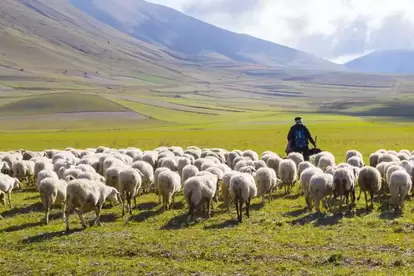


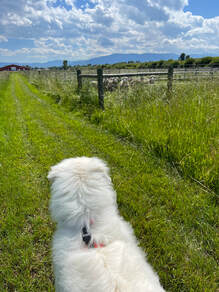
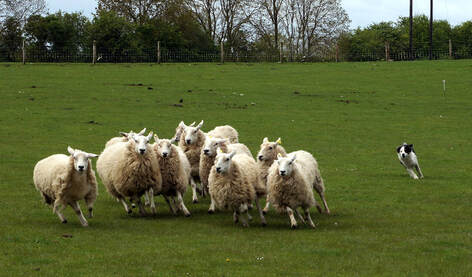
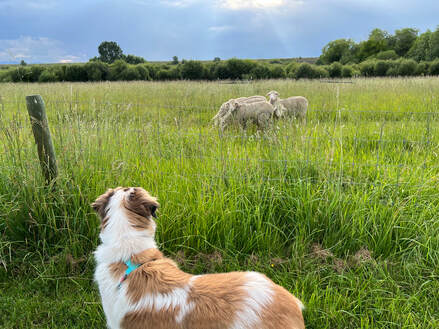

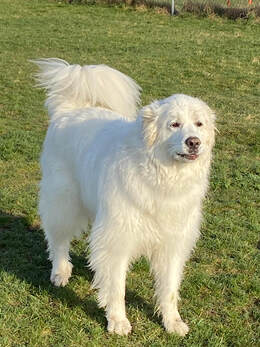
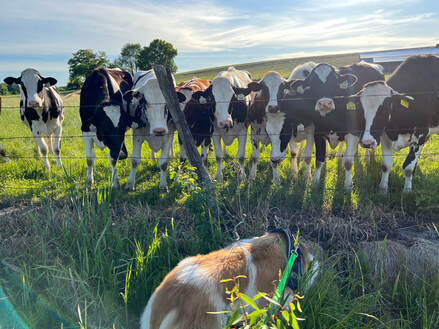

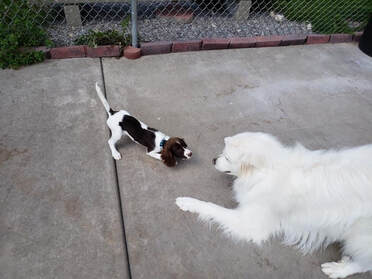


 RSS Feed
RSS Feed